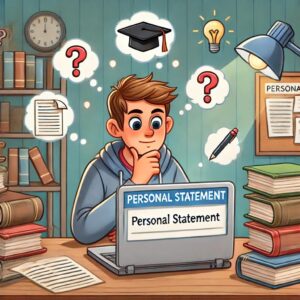
So let’s get the main question out of the way: are you too old for law school? No. No, you’re not. When I was in law school, I had two classmates in their mid-40s. When I was getting my Ph.D., I had a classmate who began his 6-year doctoral program at 49. I have helped a client in her sixties earn admission to college. So no, you’re not too old. If this is something you want to do, are passionate about, and feel like you have the energy to take on… do it! Gurufi has had a ton of success getting “nontraditional” candidates into top law schools, so if you’re worried about this, work with us!
For reference, the average age of first-year law students in the United States is around 25, according to the Law School Admission Council (LSAC). However, that number has slowly been ticking up because schools are valuing experience more, and this age range is quite broad, with individuals ranging from their early twenties to their fifties and beyond. In fact, according to a report by the American Bar Association (ABA), the number of law students over the age of 50 has steadily increased in recent years.
One common concern for older individuals considering law school is the time commitment and cost of pursuing a legal education. Law school is a significant investment of time and money, and it is important to carefully consider these factors before making a decision. This includes thinking about the loan process and what it would mean to potentially have student loans for the rest of your life. However, it is worth noting that many law schools offer part-time or evening programs that may be more accommodating to students who are balancing other responsibilities, such as work or family. Additionally, there are many scholarships and financial aid options available to help students finance their legal education.
Another concern for older students is the competitiveness of law school admissions. However, it is important to remember that law schools look at a range of factors beyond just undergraduate GPA and LSAT scores. Life experience, work experience, and other accomplishments can all be valuable factors in the admissions process. In fact, many law schools actively seek out and value nontraditional students who bring unique perspectives and experiences to the classroom. In fact, for older students, I would urge you to lean into your age, emphasize the unique journey that brought you to this point, and emphasize the range of experiences, accomplishments, and circumstances that will inform your participation in the school and your contributions to the profession.
One advantage that older students may have over their younger counterparts is their life experience and maturity. These qualities can be particularly valuable in the legal profession, where the ability to handle complex and emotionally charged situations with empathy and professionalism is essential. Additionally, older students may have a clearer sense of their career goals and a greater sense of motivation and dedication to their studies.
It is also worth noting that there are many different career paths within the legal profession, and some may be more accommodating to older students than others. For example, some law firms may value the life experience and perspective that older attorneys bring to their practice. In addition, some areas of law, such as elder law or estate planning, may be particularly well-suited to older students. Importantly, if you do hope to work at a firm after law school, think through whether you’d be willing and able to work the kinds of long, grueling hours that new hires are often subject to. If you have complex family commitments, it may not be for you.
One challenge that older students may face when entering law school is adapting to the demands of a rigorous academic program. However, many law schools offer resources and support services to help students succeed, including academic advising, tutoring, and writing centers. Additionally, older students may be better equipped to manage their time and balance their other responsibilities than their younger counterparts.
Finally, it is important to remember that age is not static. I know many 60-year-olds who have more pep, energy, focus, and drive than even the hungriest 25-year-old. As they say, age is just a number, and success in law school and beyond is largely dependent on one’s dedication, commitment, and passion for the law. There are many examples of successful attorneys who entered law school at an older age, including Ruth Bader Ginsburg, who began law school at the age of 21 but did not begin her legal career until she was in her late 30s.
In short, the core questions you ask when deciding whether to attend law school are the same that any applicant would: why law? Do I really want to do this? Can I pay for it? Is my life set up for the kind of commitment this entails? Do I have a plan for after? In itself, age should not be a barrier to pursuing a career in law. While there may be certain challenges and considerations that are unique to older students, there are many resources and support systems available to help them succeed. With dedication, hard work, and a passion for the law, older students can successfully navigate law school and go on to have fulfilling and rewarding careers as attorneys.
- “Age Distribution of Law Students.” Law School Admission Council, https://www.lsac.org/data-research/data/current-volume-highlights/age-distribution-law-students.
- “Am I Too Old for Law School?” Law School Admission Council, 2022, https://www.lsac.org/choosing-law-school/law-school-age.
- “Is There a ‘Best’ Age for Law School?” ABA for Law Students, 2021, https://abaforlawstudents.com/2018/03/29/is-there-a-best-age-for-law-school/.
- “When Is It Too Late to Go to Law School?” U.S. News & World Report, 2022, https://www.usnews.com/education/best-graduate-schools/top-law-schools/articles/when-is-it-too-late-to-go-to-law-school.
- “Too Old for Law School? Think Again.” Kaplan Test Prep, 2022, https://www.kaptest.com/study/lsat/too-old-for-law-school-think-again.
- “Is It Too Late to Become a Lawyer?” The Balance Careers, 2022, https://www.thebalancecareers.com/is-it-too-late-to-become-a-lawyer-2164493.
- “Am I Too Old for Law School?” The Princeton Review, 2022, https://www.princetonreview.com/law-school-advice/am-i-too-old-for-law-school.
- “When Is It Too Late to Go to Law School?” Medscape, 2021, https://www.medscape.com/viewarticle/935787.
- “Is There an Ideal Age for Law School?” Top Law Schools, 2022, https://www.top-law-schools.com/ideal-age-for-law-school.html.
- “Am I Too Old for Law School?” ThoughtCo, 2022, https://www.thoughtco.com/am-i-too-old-for-law-school-4777378.
- “The Pros and Cons of Going to Law School Later in Life.” Noodle, 2019, https://www.noodle.com/articles/pros-cons-going-law-school-later-life.
- “Starting Law School Later in Life.” American Bar Association, 2019, https://www.americanbar.org/groups/legal_education/resources/publications/aba-prelaw-newsletter/2018-19/vol-18-no-2/starting-law-school-later-in-life/.
- “Too Old for Law School?” Law School Toolbox, 2021, https://lawschooltoolbox.com/too-old-for-law-school/.
- “Is It Ever Too Late to Go to Law School?” Prospective Law Students, 2022, https://www.prospectivelawstudents.com/is-it-ever-too-late-to-go-to-law-school.
- “How to Navigate Law School as an Older Student.” American Bar Association, 2018, https://www.americanbar.org/groups/law_students/resources/aba-prelaw-newsletter/2017-2018/vol-17-no-3/how-to-navigate-law-school-as-an-older-student/.
- “Never Too Late: 6 Stories of Older Students Who Went to Law School.” National Jurist, 2018, https://www.nationaljurist.com/national-jurist-magazine/never-too-late-6-stories-older-students-who-went-law-school.
- “Going to Law School Later in Life.” Attorney at Work, 2020, https://www.attorneyatwork.com/going-to-law-school-later-in-life/.
- “Is It Too Late to Become a Lawyer?” All Law, 2022, https://www.alllaw.com/articles/nolo/career/professional/is-it-too-late-become-lawyer.html.



